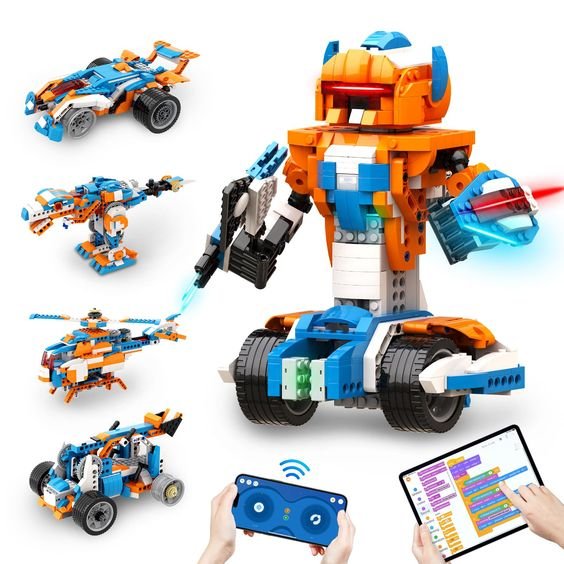Best Educational Toys for Children: Fun and Learning Combined
When it comes to fostering creativity, critical thinking, and skill development in young learners, educational toys for children are an invaluable resource. Robotix Institute understands the importance of toys that go beyond play and offer meaningful learning experiences. In this guide, we’ll introduce some of the best educational toys for children that combine fun with cognitive and physical benefits, making them ideal for curious and active young minds.
Why Choose Educational Toys for Children?
Educational toys do more than entertain—they encourage children to learn new skills, explore concepts, and build a strong foundation for future learning. Here’s why educational toys are beneficial for children’s growth and development:
- Promote Problem-Solving Skills: Many educational toys, such as puzzles and building blocks, help children develop problem-solving skills as they figure out solutions on their own.
- Enhance Motor Skills: Toys that require manipulation, like stacking blocks or shape sorters, improve fine motor skills and hand-eye coordination.
- Encourage Creativity and Imagination: Creative toys like art sets, construction kits, and pretend-play toys encourage children to think imaginatively and explore ideas.
- Develop Social Skills: Interactive toys that encourage cooperative play teach children valuable social skills like sharing, empathy, and teamwork.
Top Educational Toys for Children by Age Group
Choosing the right educational toy depends on the age and developmental stage of the child. Here’s a breakdown of some of the best options for each age group, ensuring children get the most from their playtime experiences.
1. Educational Toys for Toddlers (Ages 1-3)
For toddlers, toys that stimulate sensory exploration and basic cognitive skills are ideal:
- Shape Sorters: Shape sorters help toddlers identify shapes and improve hand-eye coordination by matching blocks to the correct slots.
- Stacking Blocks: Stacking toys encourage fine motor skills and understanding of balance as children stack and organize blocks.
These toys allow toddlers to learn through exploration and hands-on play, which is crucial for early development. Explore more toddler learning resources on Robotix Institute’s website.
2. Educational Toys for Preschoolers (Ages 3-5)
Preschoolers are ready for toys that introduce concepts like numbers, letters, and basic problem-solving:
- Alphabet and Number Blocks: These toys introduce preschoolers to letters and numbers in a fun, engaging way that makes early learning enjoyable.
- Interactive Storybooks: Interactive books that incorporate audio features or touchable elements make reading fun and help develop early literacy skills.
These toys are perfect for preparing preschoolers for their early educational years, fostering a love for learning. Check out our preschool learning section for more ideas.
3. Educational Toys for School-Aged Children (Ages 5-8)
For school-aged children, toys that encourage problem-solving, creativity, and logical thinking are ideal:
- STEM Kits: Science, Technology, Engineering, and Math (STEM) kits provide hands-on experiences that teach children about circuits, chemistry, and coding.
- Building Sets (e.g., LEGO): Building sets challenge children to create structures, improving spatial awareness and creative thinking.
STEM-focused toys are ideal for school-aged children who are ready for more complex concepts. Discover more STEM learning resources on Robotix Institute’s website.
4. Educational Toys for Preteens (Ages 8+)
For older children, toys that focus on logic, strategy, and critical thinking are excellent choices:
- Robotics Kits: Robotics kits allow preteens to build and program their own robots, providing hands-on experience with technology and engineering principles.
- Board Games and Strategy Games: Board games like chess or strategy games challenge children to think critically and plan ahead.
These toys offer more advanced learning opportunities and prepare preteens for future academic and social challenges. Explore more robotics and board games for preteens.
Choosing the Best Educational Toys for Children
With so many options available, it’s essential to choose toys that best suit your child’s interests and developmental needs. Here are some tips to make an informed choice:
- Identify Your Child’s Interests: Whether your child loves art, math, or building, choose toys that align with their interests for maximum engagement.
- Look for Age-Appropriate Toys: Always check the recommended age range to ensure the toy is developmentally appropriate and challenging without being frustrating.
- Check for Safety and Durability: Look for toys that are made from safe, non-toxic materials and designed to withstand wear and tear.
Benefits of Educational Toys at Robotix Institute
At Robotix Institute, we offer a range of high-quality, carefully curated educational toys designed to support children’s learning and development in meaningful ways. Here’s what makes our collection unique:
- Expertly Curated: Every toy in our collection has been selected by educational experts to provide maximum learning value and fun.
- Support for Holistic Development: Our toys are designed to nurture cognitive, social, emotional, and physical growth in children.
- Trusted Quality and Safety: We prioritize safety and quality, offering toys that are free from harmful materials and suitable for young children.
Start Your Child’s Learning Journey with Robotix Institute
Educational toys for children are an incredible way to make learning enjoyable and impactful. Whether you’re looking for STEM toys, building blocks, or creative play kits, Robotix Institute has a comprehensive selection to meet every child’s needs. Visit our educational toys page to find the perfect toy for your child and help them embark on a fun, learning-filled journey!
For additional insights on educational toys, check out NAEYC’s resources on early childhood education for expert advice on the best learning tools for kids.

